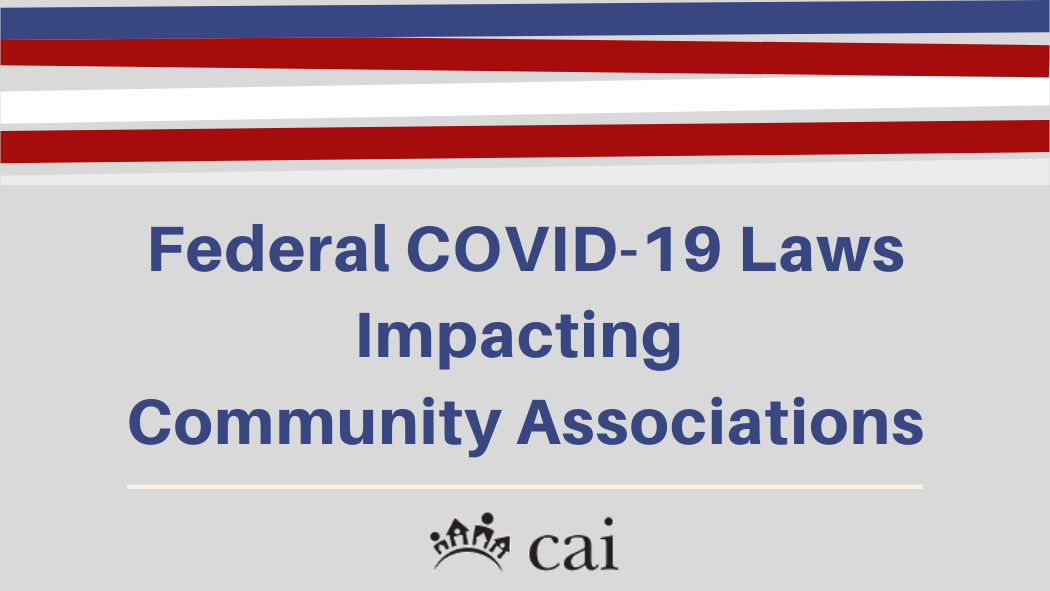Several federal actions addressing COVID-19 are directly affecting community associations. Since President Trump signed the March 13 proclamation declaring a National Emergency Concerning the Novel Coronavirus Disease (COVID-19) Outbreak, federal regulatory agencies have mandated moratoriums on mortgage foreclosures and evictions, and instituted loan forbearance programs. Congress also passed stimulus legislation impacting small businesses, employees, and individuals.
Two federal laws were signed to address assistance for people and businesses impacted by COVID-19:
- H.R. 748 – Coronavirus Aid, Relief, and Economic Security Act or the “CARES” Act (third stimulus package, signed into law March 27)
- H. R. 6201 – The Families First Coronavirus Response Act (signed into law March 18)
Major provisions in the CARES Act and the Families First Coronavirus Response Act should be of interest to community associations, including:
- Housing-Related Provisions
- Credit Reporting: Community associations reporting payment information to credit bureaus (Experian, TransUnion, Equifax) are required to report accounts as current if the association offers an owner a flexible assessment payment plan (an accommodation) during the COVID-19 national emergency.
- National Mortgage Forbearance: The CARES Act allows any homeowner experiencing a financial hardship due to the COVID-19 national emergency to request up to 60 days’ mortgage loan forbearance. A homeowner may request mortgage forbearance even if the mortgage is current—there is no requirement a borrower miss mortgage payments to qualify.
- National Mortgage Foreclosure Moratorium: The CARES Act imposes a nationwide foreclosure moratorium for federally backed mortgages. Approximately 65% of mortgages nationwide are considered federally backed.
- National Moratorium on Evictions: The national government response to the COVID-19 pandemic relies on individuals and households sheltering in place and practicing social distancing. The CARES Act national eviction moratorium supports this policy.
- Paycheck Protection Program: The Paycheck Protection Program is a $349 billion loan and grant program administered through the Small Business Administration program to help small businesses and nonprofit organizations remain solvent and retain employees.
- Small Business Administration
- Economic Injury Disaster Loan Program: Community associations and business partners are eligible to apply for SBA Economic Injury Disaster Loans. Community associations in all states are eligible to apply.
- Emergency Family and Medical Leave Expansion
- Family Leave Program Detail: Companies with fewer than 500 workers are required to provide 12 weeks of partially paid Public Health Emergency Leave to employees who have been employed at least 30 calendar days and who are unable to work (or telework) due to certain childcare hardships.
- Emergency Paid Sick Leave Act: Employers are required to provide paid sick leave during the COVID-19 pandemic to employees due to certain hardships.
- Sick Leave Program Detail: Full-time employees are entitled to 80 hours of sick leave and the number of hours a part-time employee works, on average, over a two-week period.
- Federal Income Tax Payment Deferral: July 15 is the new filing deadline for all federal income taxes.
Click here for information regarding FEDERAL GOVERNMENT ACTIONS during the COVID-19 pandemic, and CAI’s analysis on how these federal laws impact community associations.




You guys are amazing for keeping all of us informed during these unprecedented times. Thank you
Thank you for this well laid out, quick, easy to read write up! It covers everything I have been following from various sources in one document!
I agree – this is so helpful! Thank you CAI I don’t know what I would do without CAI during this COVID-19 time. Thank you so much – Jess in NoVA
Thanks CAI!